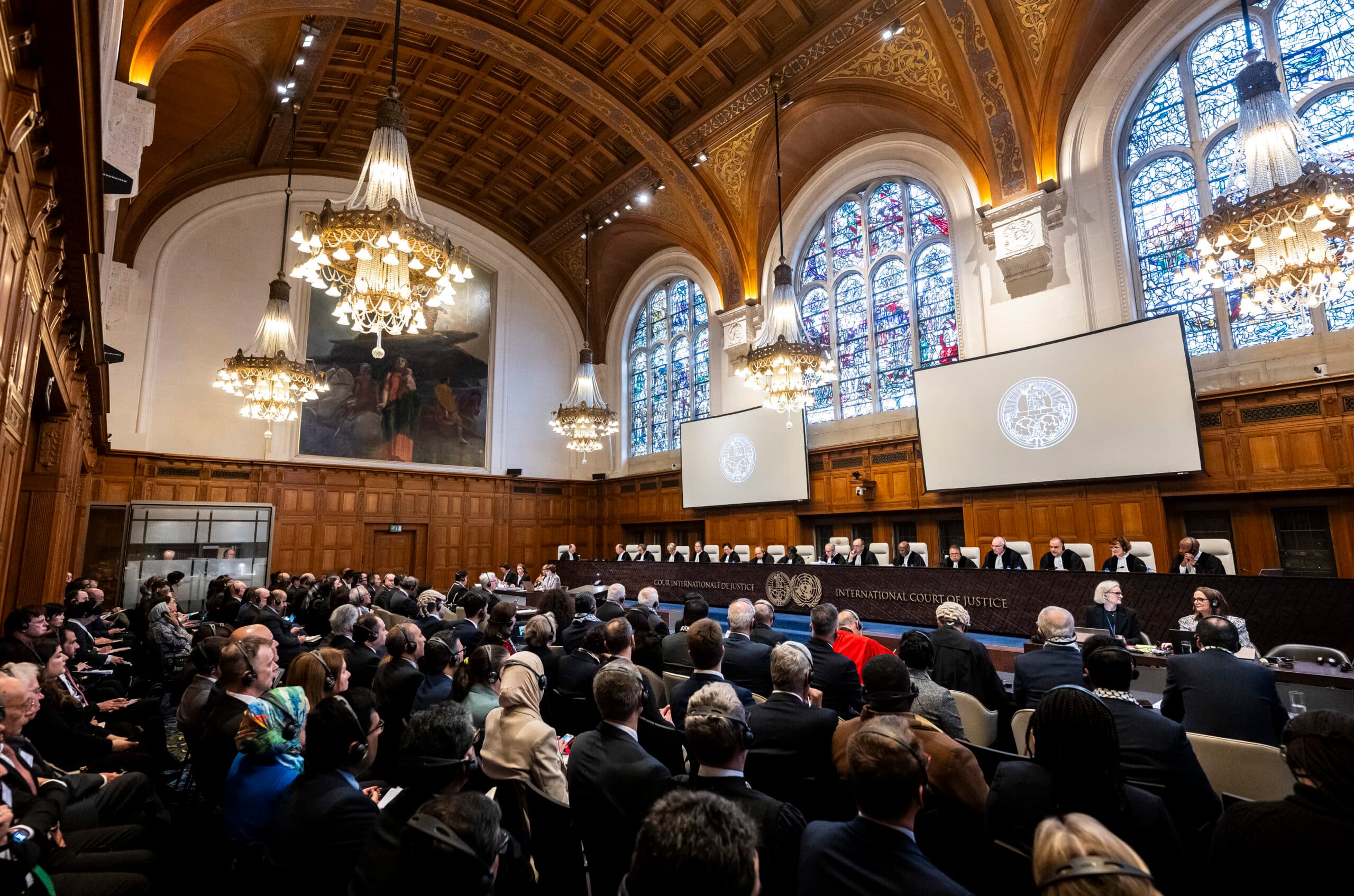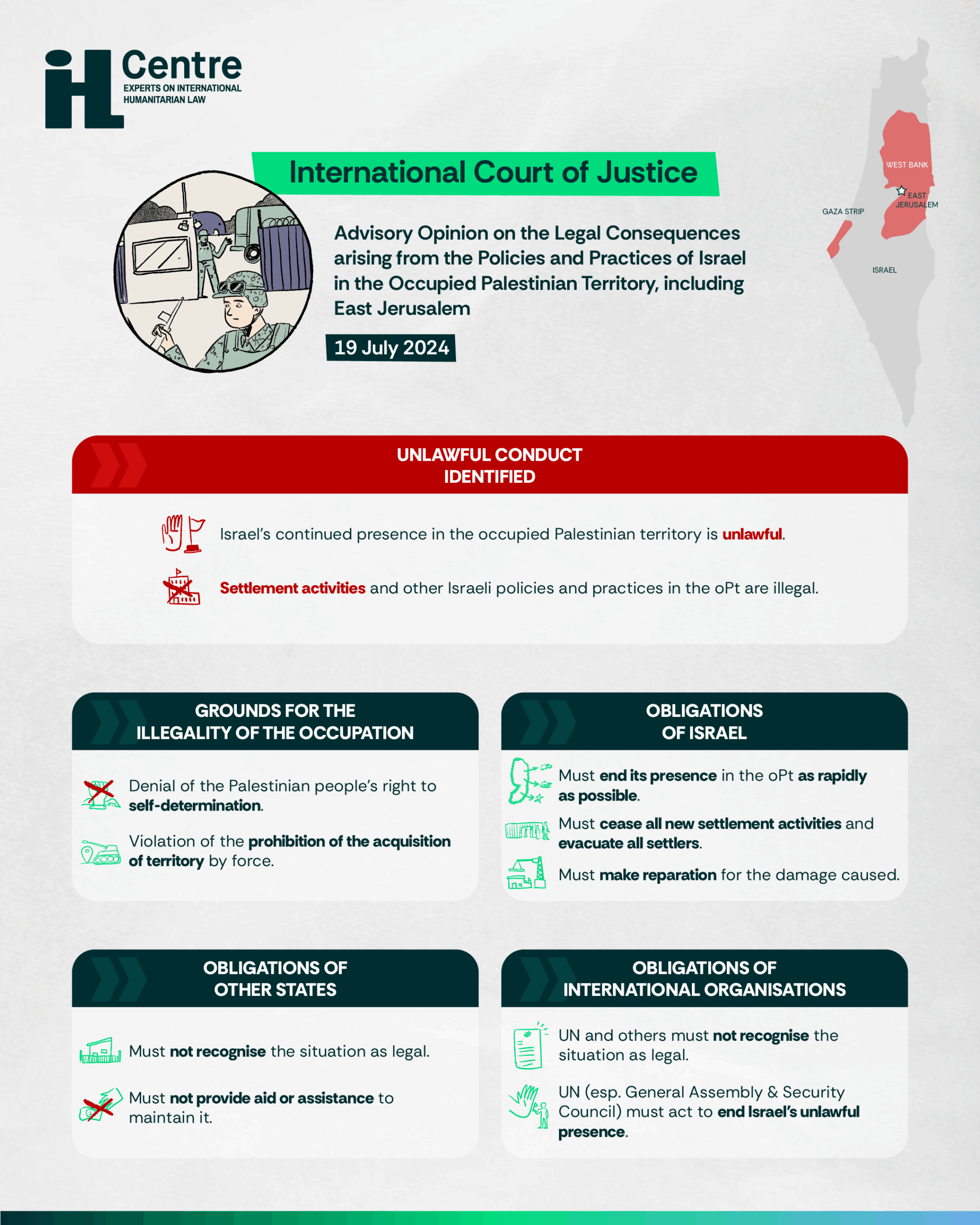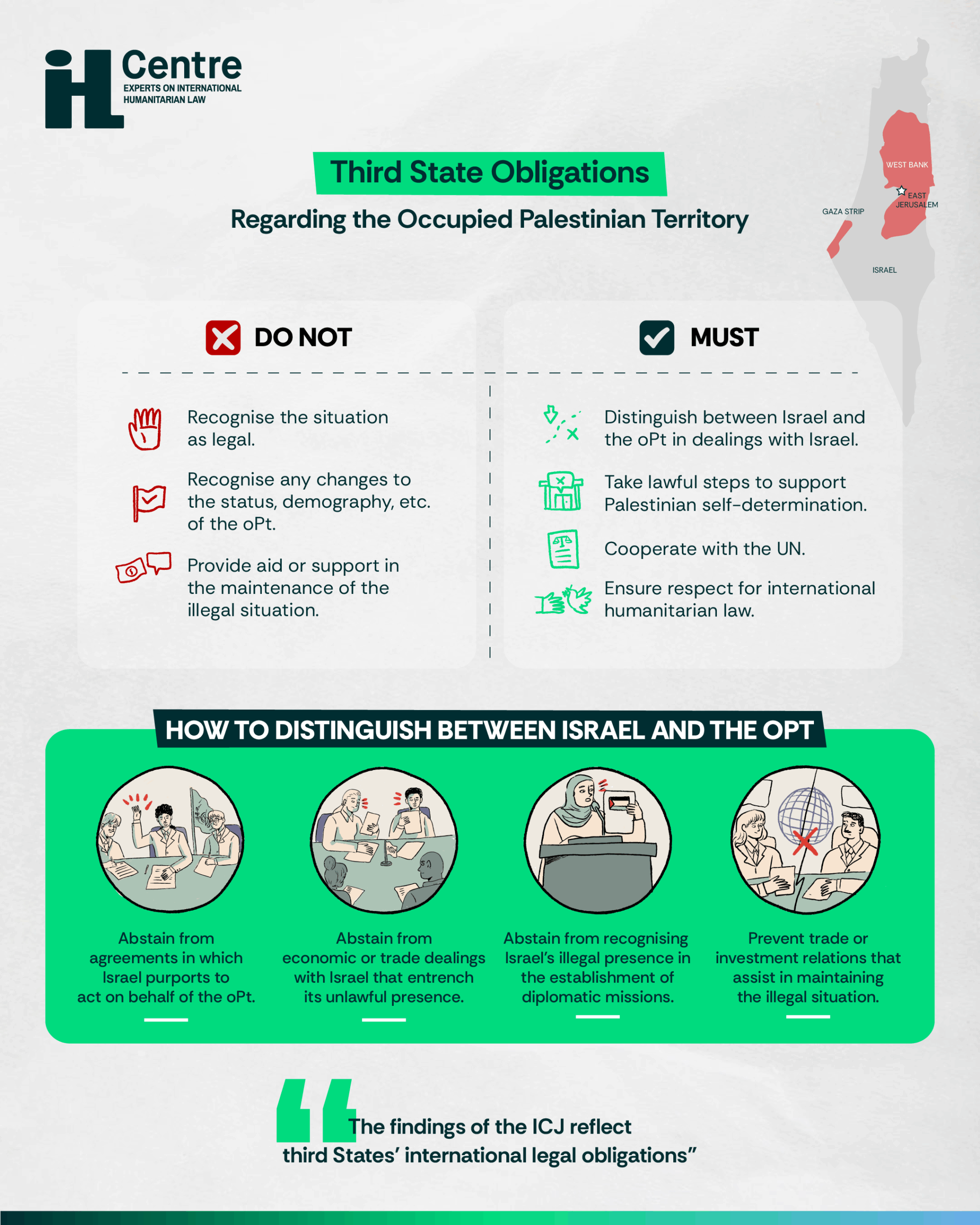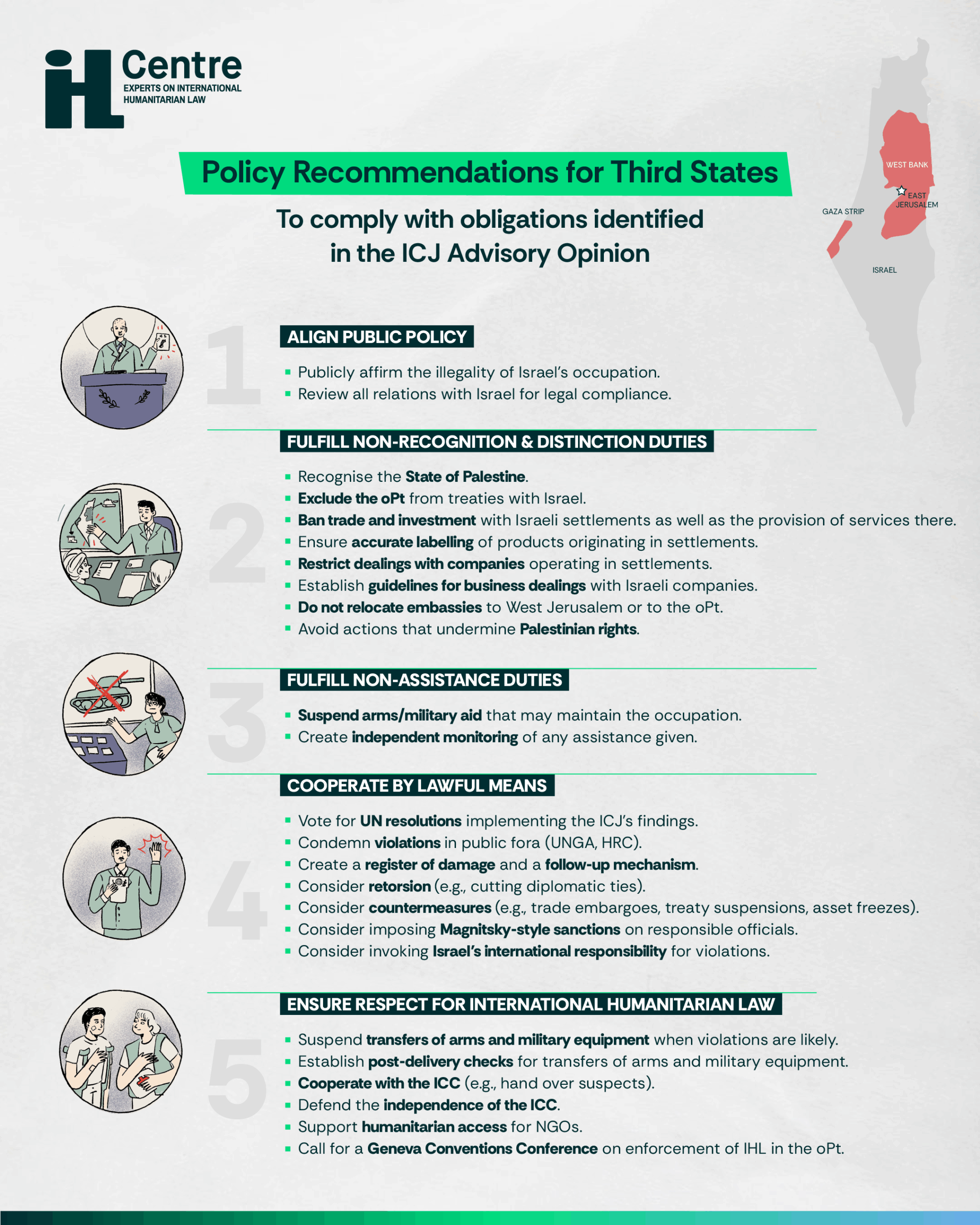
One Year On, the Devastating Cost of Ignoring the ICJ’s July 2024 Advisory Opinion
21 July 2025One year ago, on 19 July 2024, the International Court of Justice (ICJ) rendered its landmark Advisory Opinion on the Legal Consequences arising from the Policies and Practices of Israel in the Occupied Palestinian Territory, including East Jerusalem.

Comprehensive obligations
The Court found, first and foremost, that Israel’s continued presence in the occupied Palestinian territory (oPt) is unlawful because it violates the Palestinian people’s right to self-determination as well as the prohibition of the acquisition of territory by force. Accordingly, Israel must bring its unlawful presence in the oPt to an end as rapidly as possible. Furthermore, the Court held that Israel must cease immediately all new settlement activity, evacuate all settlers from the oPt, and make reparation for damage caused to all natural or legal persons concerned in the oPt.
The Court also set out detailed obligations for third States. In the Court’s view, all States are under an obligation not to recognise as legal the situation arising from Israel’s unlawful presence in the oPt, including by means of distinguishing in their dealings with Israel between the territory of Israel and the oPt, and not to render any aid or assistance in maintaining the illegal situation. States must further take lawful measures to ensure Israel’s compliance with international humanitarian law (IHL), and that any impediment resulting from Israel’s illegal presence to the exercise of the Palestinian people’s right to self-determination is brought to an end.
The duty of non-recognition is also incumbent upon international organisations, including the United Nations (UN). In addition, the Court held that the UN, and especially the General Assembly and the Security Council, should consider the precise modalities and further action required to bring Israel’s unlawful presence in the oPt to an end as rapidly as possible.
The General Assembly adopted a resolution on the Advisory Opinion on 18 September 2024, endorsing the Court’s findings and demanding that Israel bring its unlawful presence in the oPt to an end ‘no later than 12 months from the adoption of the … resolution’. It also called for specific measures that third States should take to discharge the obligations identified by the Court, such as ceasing the importation of products originating in Israeli settlements and the transfer of arms, munitions, and related equipment to Israel in all cases where there are reasonable grounds to suspect that they may be used in the oPt, creating an international register of damage done to all persons concerned, as well as to the Palestinian people, and implementing sanctions against persons engaged in the maintenance of Israel’s unlawful presence in the oPt.

Lack of implementation
The contrast between the Court’s far-reaching findings and the reality prevailing in the oPt in the aftermath of the Advisory Opinion could not be starker.
The Gaza Strip has been devastated by 21 months of hostilities. According to the Ministry of Health in Gaza, as of 16 July 2025 more than 58,000 persons have been killed and over 139,000 others injured. Large swathes of homes and critical civilian infrastructure have been reduced to rubble; starvation and famine have set in; and the healthcare system is in a state of collapse. Recurring blockades of humanitarian aid and commercial supplies have recently been replaced by an unlawful Israeli-imposed delivery scheme that is wholly inadequate to meet the needs of the civilian population; Israeli forces and private contractors have repeatedly opened fire on aid seekers posing no threat at the ‘distribution hubs’, reportedly killing hundreds and injuring thousands. The Israeli government has been mulling plans to permanently displace Palestinians from Gaza; in early July, Israeli Defence Minister Israel Katz suggested that the population would be ‘concentrated’ in the destroyed city of Rafah. Documents seen by Reuters featuring the name of the ‘Foundation’ implementing Israel’s unlawful delivery scheme in Gaza reportedly propose the creation of ‘humanitarian transit areas’. Overall, conditions of life in Gaza pose an unprecedented threat to the continued survival of the Palestinian population.
In the West Bank, including East Jerusalem, Israeli forces have killed over 900 Palestinians and injured more than 8,000 others between 7 October 2023 and mid-July 2025, according to the United Nations Office for the Coordination of Humanitarian Affairs (OCHA). A large-scale operation by the Israeli military in the north of the West Bank, which remains ongoing at the time of writing, has displaced around 40,000 persons, many of them residents of vulnerable refugee camps. The freedom of movement of Palestinian residents throughout the West Bank is severely curtailed. More than 700 incidents of settler violence have been documented in 2025 alone, which go all but unpunished. Entire communities in the Jordan Valley have been forcibly transferred because of settler violence. All the while, the Israeli government has been advancing plans to entrench the settlement enterprise, with 22 new settlements approved at the end of May – some involving the expansion of existing settlements as well as the retroactive ‘authorisation’ of outposts.
Call to action
The catastrophic situation in the oPt as well as the complete absence of any apparent intention on the part of Israel to end its presence there strongly indicate Israel’s continued lack of compliance with the findings of the Court as well as its underlying obligations under treaty and customary international law. Under these circumstances, it is crucial, and legally required, for third parties to take action.
Particular responsibility lies with third States – they have a duty to ensure respect for IHL as well as obligations in case of serious breaches of peremptory norms, such as those identified in the Advisory Opinion. As the General Assembly specified, third States also have a range of means at their disposal – for example in the realm of diplomatic, military, and economic relations – to exert influence on Israel.
The Irish government, for example, is preparing draft legislation that would ban the import of goods produced in Israeli settlements in the oPt, while Norway and Denmark have revised their trade advisories. Third States with economic and other relations with Israel have leverage – and a legal obligation – to do much more. Yet many such States have continued with business as usual. In this regard, the recent failure of the Foreign Affairs Council of the European Union (EU) to take action with a view to suspending (parts of) the EU-Israel Association Agreement despite well-documented violations of international human rights law and related areas of international law by Israel is deeply concerning.
Because there is no centralised enforcement mechanism in international law, third States must step in to ensure that Israel’s unlawful presence in the oPt is brought to an end, that the Palestinian people’s right to self-determination is finally realised, and that those responsible for past and ongoing violations of international law are held accountable. It is not just the continued existence of the Palestinian people in the oPt that depends on this, but also the authority of the Court and the wider international rules-based order established in the wake of the horrors of the Second World War. One year on, the cost of ignoring the ICJ is far too high.

Cover photo: View of the ICJ courtroom at the start of the hearings, Monday 19 February 2024. UN Photo/ICJ-CIJ/Frank van Beek. Courtesy of the ICJ. All rights reserved.